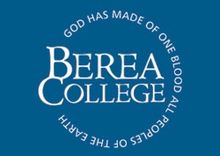Berea College
Berea College is a private liberal arts college in Berea in the American state of Kentucky . It was the first co-educational college open to students of different "racial backgrounds" in the American southern states. Furthermore, the Berea College is characterized by the fact that there is no tuition fee.
history
In 1855 the abolitionist John G. Fee founded the college. During the American Civil War he served as a missionary in a camp established by the Union Army for escaped and freed slaves in Camp Nelson , Kentucky. In 1866, with the legacy of Methodist Pastor Charles Avery and support from the Freedmen's Bureau and the American Missionary Association, a foundation was established to provide financial security for the college's work. Many former African American Civil War soldiers were among the first to graduate .
In 1896 the Supreme Court of the United States overturned Plessy v. Ferguson on the 14th Amendment to the American Constitution with 7 votes in favor and one against; this made it possible for the individual states to introduce racial segregation into the education system. That vote against came from Kentucky Federal Judge John Marshall Harlan . In 1904, the State of Kentucky banned common classes for students of different races in the Day Law named after Carl Day. That only affected Berea College, which fought up to the Supreme Court for the continuation of its educational system, but ultimately failed. Black students could not attend college for more than 40 years. In response to segregation policies, the college split its foundation, and with additional donations, the Lincoln Institute began its work for African American students in Shelby County , Kentucky.
In 1950 an amendment was added to the Kentucky Day Law allowing Berea College to accept African American students; In 1954, the Brown vs. Board of Education declared racial segregation in public schools to be incompatible with the American Constitution. A year later, the American civil rights movement began its actions. In 1965, students and faculty at Berea College went to Alabama to take part in the Selma to Montgomery marches . College members were also involved in local civil rights demonstrations.
Alumni
Well-known graduates from Berea College are:
- John Fenn (1917-2010), chemist
- George Samuel Hurst (1927–2010), physicist, inventor of touchscreen technology
- Juanita M. Kreps (1921–2010), economist and politician
- George Lester, developer of the catalyst
- Jack Roush (* 1942), founder and chief executive officer of the NASCAR racing team Roush Fenway Racing
- Carter G. Woodson (1875-1950), historian
present
Around 1,600 students attend the college; they come from almost every US state and over 60 states worldwide. The faculty consists of 130 full-time employees; 90% of teachers have the highest degree in their respective subject. Bachelor of Arts or Bachelor of Science degrees are possible in 32 study programs. In 2017, 41% of college graduates were debt free, the remainder had debt averaging $ 5,998, while the national average is $ 37,000.
Web links
- Own website: Berea College
